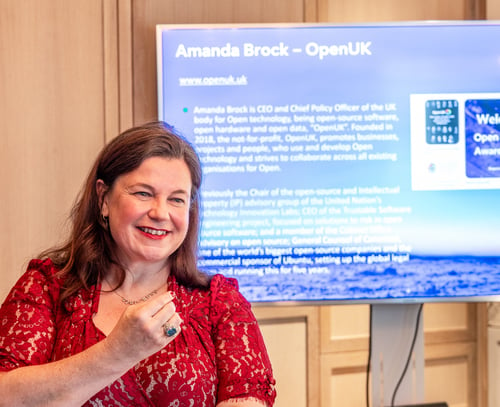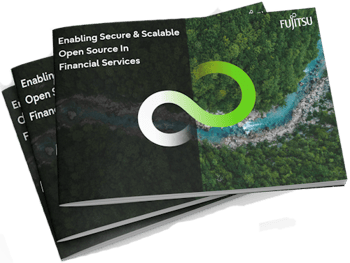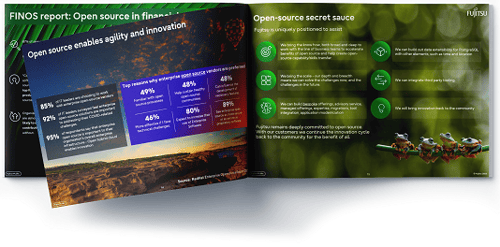
Getting together
Last week in the heart of London’s financial district, a select group of industry leaders convened for an executive roundtable entitled "The Future of OS: Enabling Secure and Scalable Open-Source in Finance."
Hosted in collaboration with Innovatus Media, the event delved into the complex landscape of open-source adoption within the financial services sector. It brought to the forefront both the formidable challenges and the promising opportunities that this disruptive force presents.
It was interesting to hear the reflections of the group as they navigated through the challenges and opportunities of Open-Source within Finance. There were varying opinions and levels of success, however it was universally accepted that the power and potential of open-source means that all organizations need to embrace a level of change in order to stay relevant and tap into skills and talent.

Exploring the challenges
Interoperability with legacy systems
For financial institutions, the integration of open-source solutions with deeply entrenched legacy systems is a pressing challenge. These systems, the backbone of daily operations, have evolved over decades, and ensuring their seamless compatibility with newer open-source technologies is a delicate dance. However the group discussed ways to bridge this gap, particularly within the context of PostgreSQL. With over 30 years of database development, expertise and contribution to open-source technology, Fujitsu Enterprise Postgres is uniquely positioned to Enable Secure and Scalable Open-Source Data Management and the Financial Services Industry is primed to draw upon the benefits.
Perceived risk and compliance culture
The financial services sector has long been characterized by its unyielding commitment to risk management and regulatory compliance. Open-source, with its inherent transparency and the potential for community-driven development, can be viewed with scepticism. Thus, overcoming the perception that open-source carries inherent security and compliance risks becomes paramount.
The solution here is fostering collaboration and understanding around the potential of open-source.
Deployment across multiple systems and jurisdictions
Operating across diverse systems and jurisdictions is the norm for global financial institutions. Yet, standardizing licensing and adhering to regulatory standards across these multifaceted landscapes can be a Herculean task. The need for consistency in the midst of such diversity is a challenge that demands attention.
It was noted however, that modern day open-source solutions are often more flexible than the initial offerings from 15 years ago. With many of these challenges being worked through by the open-source community.
C-Suite understanding and buy-in
A significant hurdle lies in securing buy-in from the highest echelons of financial organizations. The C-suite must not only comprehend the power and potential of open source but also champion its adoption. Education is key; executives need to be enlightened about the benefits while addressing their concerns.

Niki Kennedy, Snr Dir Software Open Innovation, Fujitsu
Exploring the opportunities
Tapping into the UK's developer community
The United Kingdom is home to one of the world's most vibrant and talented developer communities. It's a treasure trove of innovation waiting to be tapped. Collaborating with this community, traditionally open-source-friendly, presents an exciting opportunity for financial institutions to accelerate their journey into the open-source realm.
AI and standardization
Artificial Intelligence (AI) and it's more advanced counterpart, Generative AI (GAI), are poised to revolutionize finance. Standardizing on open source platforms can serve as the launchpad for institutions to leverage AI effectively. This standardization can streamline AI implementation, unlocking its transformative potential.
Scalability and competition
In the era of digital transformation, scalability and agility are non-negotiable. Open-source and cloud-native environments offer precisely that. Financial institutions can leverage these capabilities to compete vigorously with nimble new entrants who predominantly operate within the open source and cloud-native ecosystems. Open-source empowers them to respond swiftly to the ever-changing dynamics of the financial landscape.
Collaboration among banks
Initiatives like those undertaken by FINEOS and OpenUK underscore the potential for greater collaboration among banks. By pooling resources and knowledge, banks can develop a unified approach to support their digital businesses. This collaboration offers economies of scale, shared solutions, and a more efficient allocation of resources.

Amand Brock, CEO Open UK
A call for comprehensive strategies
The confluence of challenges and opportunities paints a complex picture. To successfully navigate these waters and harness the full potential of open-source, financial institutions must develop comprehensive strategies.
In the spirit of collaboration, financial institutions should recognize the wealth of talent residing within the UK's developer community. Engaging this community in a meaningful way can propel open source projects forward.
The promise of AI and GAI in finance beckons, but its realization hinges on the foundation of open-source standardization. Financial institutions should consider this as a strategic imperative.
Scalability and competition are vital in today's landscape. Open-source and cloud-native environments offer the agility required to outmanoeuvre new market entrants. Embracing open-source can empower financial institutions to remain agile and competitive.
Lastly, the industry should look to foster greater collaboration among banks. Initiatives like FINEOS and OpenUK exemplify the potential for collective efforts to drive digital transformation forward, creating a more cohesive and efficient industry ecosystem.
In conclusion

As financial institutions embark on this journey, one thing is clear: open-source is not merely an option; it is the future. And those who embrace it today will shape the financial landscape of tomorrow.
You can grab hold of the material that we presented during the session by downloading the PDF here.








